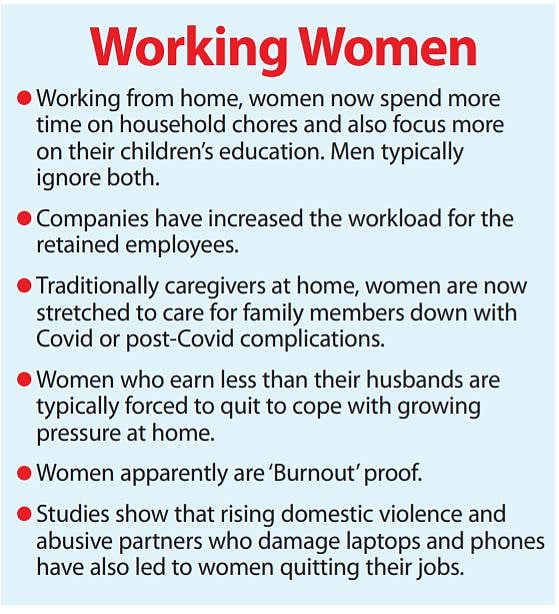COVID-19: Working women bear the brunt of the pandemic
A disproportionately large number of working women seem to have been forced to quit following the pandemic

"They told me that I had to join back immediately or I would be blacklisted forever.” The warning from her previous employer forced her to quit but still rings in Shatakshi Srivastava’s ears like a nightmare.
The Covid-19 pandemic hasn’t been easy on anyone. People have lost their loved ones, their jobs and their lifelong savings. In March 2021, McKinsey reported that Covid-19 has impacted working women even more. Almost 25 percent of women were considering quitting their jobs or “downshifting their careers” to make space for their family, the report added.
While ‘Work From Home’ was supposed to make things easier for people, it has blurred the boundaries of office and home and forced women to balance home and work with added stress from both ends.
Srivastava, who worked with a Delhi-based firm, recalls how the company threatened to blacklist her and practically harassed her till she quit. She says that she had joined the company in September last year, and was still in her training period when she tested positive for the virus. She applied for a 14-day leave, and after it was over, she informed the company that she’d need more time as her father was hospitalised. She adds, “The HR did not tell me whether they wanted me to join back immediately or whether they had extended my leave. At the moment, I didn’t care much because my father’s health was deteriorating.”

Srivastava lost her father to Covid-19 and that’s when her company too turned its back on her. She needed a few days to collect herself, but instead of being supportive, the company told her to give them a date when she’d be joining back.
Srivastava adds, “It was already over a month since my leave began, and the HR called me at 11 pm in the night and screamed at me that I’d be blacklisted from the company forever.” She quit but was asked to pay back one month’s salary. The lack of empathy from several corporate offices has been shocking. It was only the support of her mother and sister that kept Srivastava going. But that isn’t the case with everyone.
For Louisa Herridge, who hails from Warrington, England, the pandemic provided her the opportunity to reflect and finally gave her the courage to quit her job as a school teacher. She says that she had already been diagnosed with Post-Traumatic Stress Disorder (PTSD) after being in an abusive relationship, and the bullying by her school’s head teacher only made matters worse for her. Her workplace had become so toxic for her that her mental health was in shambles, and she’d suffer from panic and anxiety attacks.
But even though she quit her job on her own, the employer didn’t make things any easier for her, and she couldn’t leave on “good terms”. However, in a lot of families, the choice to quit or continue their own jobs doesn’t rest with women.
Indu Chawla (59), who hails from Lucknow, too had to quit her job last year. She was a teacher at New Public Inter College. After the pandemic hit, the school had to downsize and they stopped the bus service that picked and dropped teachers from their homes. But they made it mandatory for the teachers to conduct online classes from the school premises itself.
Chawla says, “The school didn’t offer any alternative, because they were trying to cut ends. My family also told me that the job wasn’t worth all the trouble, since one could get infected with the virus.” And so, she decided to quit.
She consoled herself with the fact that she would have retired in a year or two anyway. But who decides what is “worth the trouble”?
Follow us on: Facebook, Twitter, Google News, Instagram
Join our official telegram channel (@nationalherald) and stay updated with the latest headlines
